A Dissertation on the Ethical Concerns of the Construction Industry
VerifiedAdded on 2023/06/13
|68
|15659
|312
Thesis and Dissertation
AI Summary
This dissertation delves into the ethical concerns prevalent within the construction industry, highlighting issues such as tendering practices, substandard materials, safety negligence, and corruption. It emphasizes the importance of ethics for a construction company's reputation and sustainability, defining ethics as a system of moral principles guiding human actions. The research employs a secondary research method, analyzing existing studies due to time constraints preventing primary data collection. Key themes explored include the social, economic, and political impact of ethics, social responsibilities of construction companies, global examples of ethical practices, challenges faced by the industry, and professional ethics. The study concludes with recommendations for improving ethical conduct and a reflective account of the researcher's experience, stressing the need for change at a fundamental level to foster a more ethical construction industry.
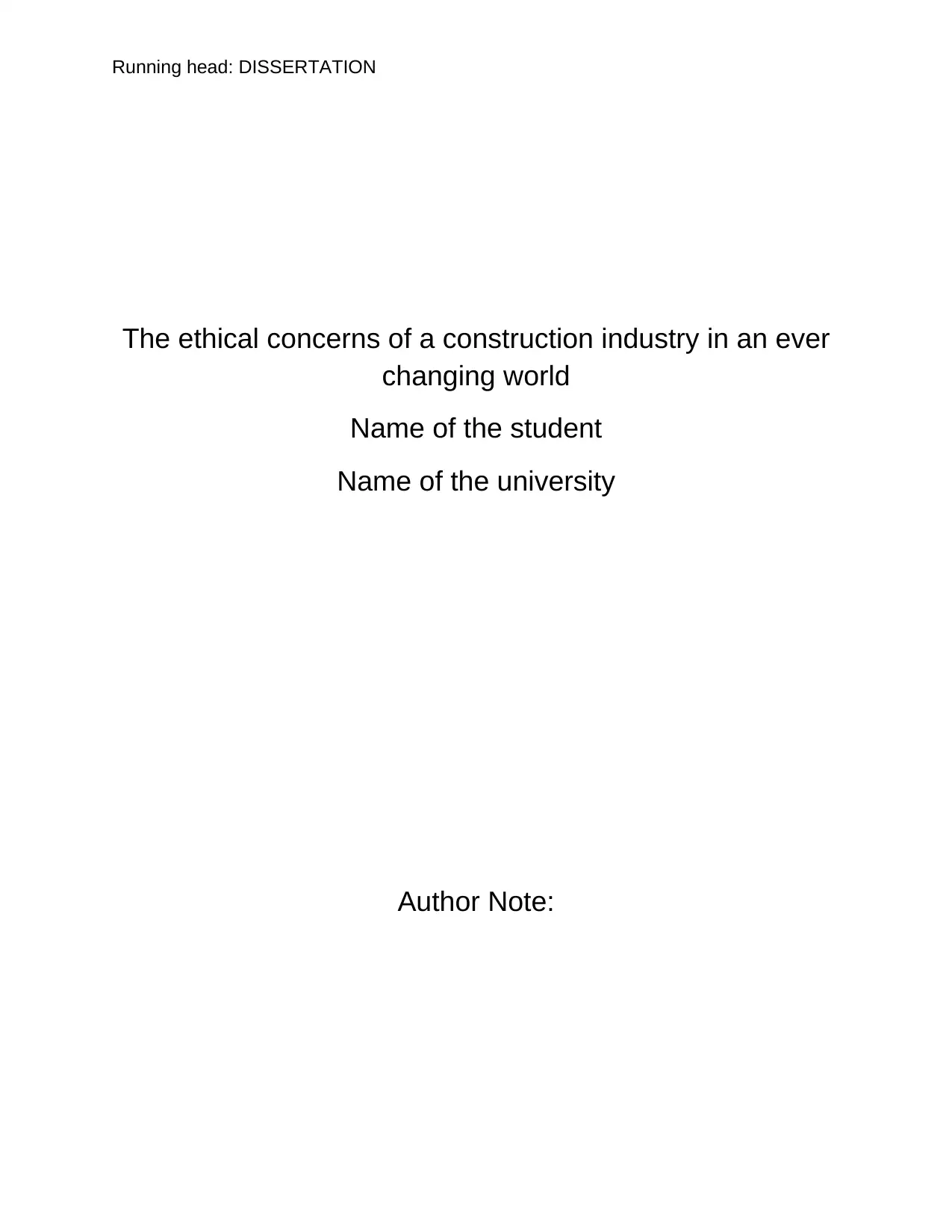
Running head: DISSERTATION
The ethical concerns of a construction industry in an ever
changing world
Name of the student
Name of the university
Author Note:
The ethical concerns of a construction industry in an ever
changing world
Name of the student
Name of the university
Author Note:
Paraphrase This Document
Need a fresh take? Get an instant paraphrase of this document with our AI Paraphraser
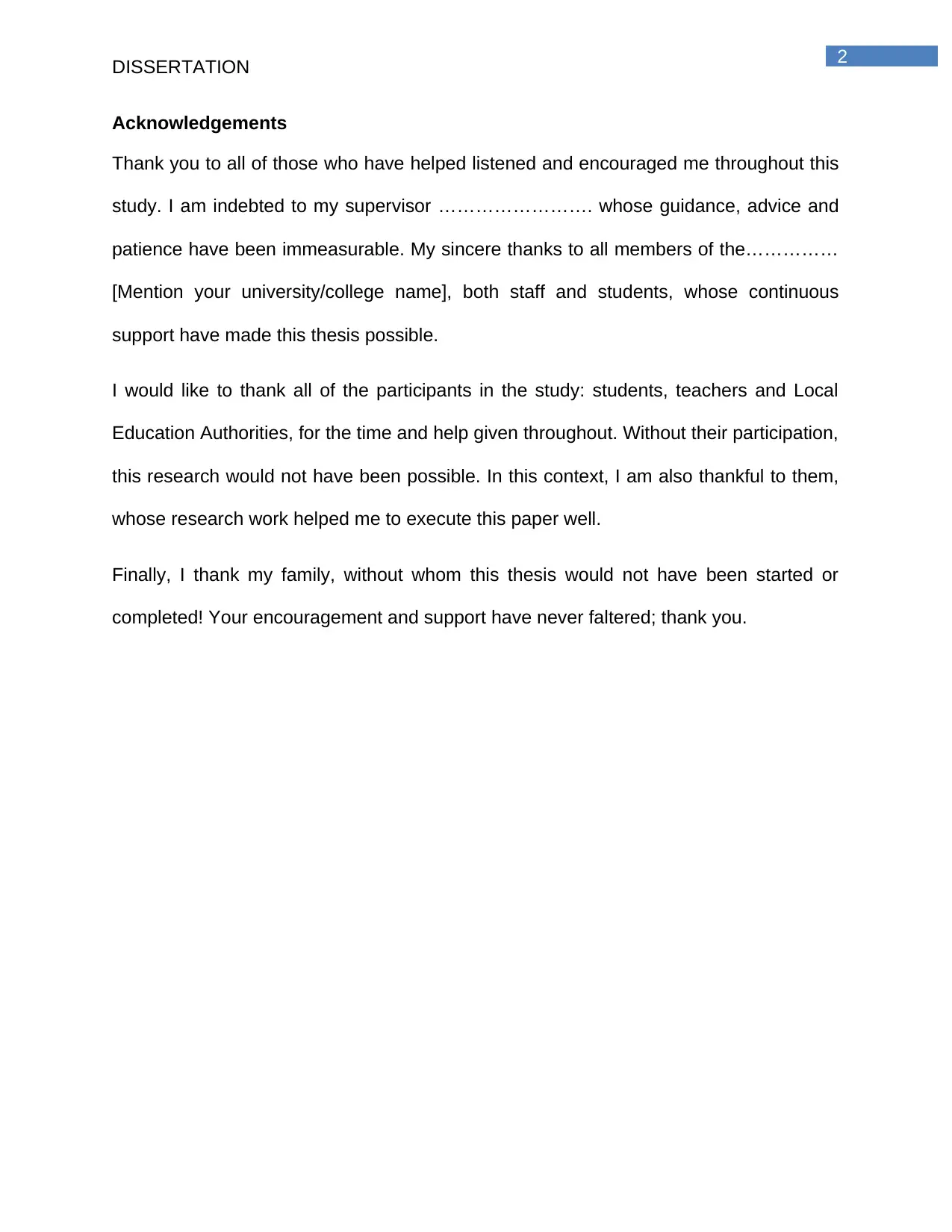
2
DISSERTATION
Acknowledgements
Thank you to all of those who have helped listened and encouraged me throughout this
study. I am indebted to my supervisor ……………………. whose guidance, advice and
patience have been immeasurable. My sincere thanks to all members of the……………
[Mention your university/college name], both staff and students, whose continuous
support have made this thesis possible.
I would like to thank all of the participants in the study: students, teachers and Local
Education Authorities, for the time and help given throughout. Without their participation,
this research would not have been possible. In this context, I am also thankful to them,
whose research work helped me to execute this paper well.
Finally, I thank my family, without whom this thesis would not have been started or
completed! Your encouragement and support have never faltered; thank you.
DISSERTATION
Acknowledgements
Thank you to all of those who have helped listened and encouraged me throughout this
study. I am indebted to my supervisor ……………………. whose guidance, advice and
patience have been immeasurable. My sincere thanks to all members of the……………
[Mention your university/college name], both staff and students, whose continuous
support have made this thesis possible.
I would like to thank all of the participants in the study: students, teachers and Local
Education Authorities, for the time and help given throughout. Without their participation,
this research would not have been possible. In this context, I am also thankful to them,
whose research work helped me to execute this paper well.
Finally, I thank my family, without whom this thesis would not have been started or
completed! Your encouragement and support have never faltered; thank you.
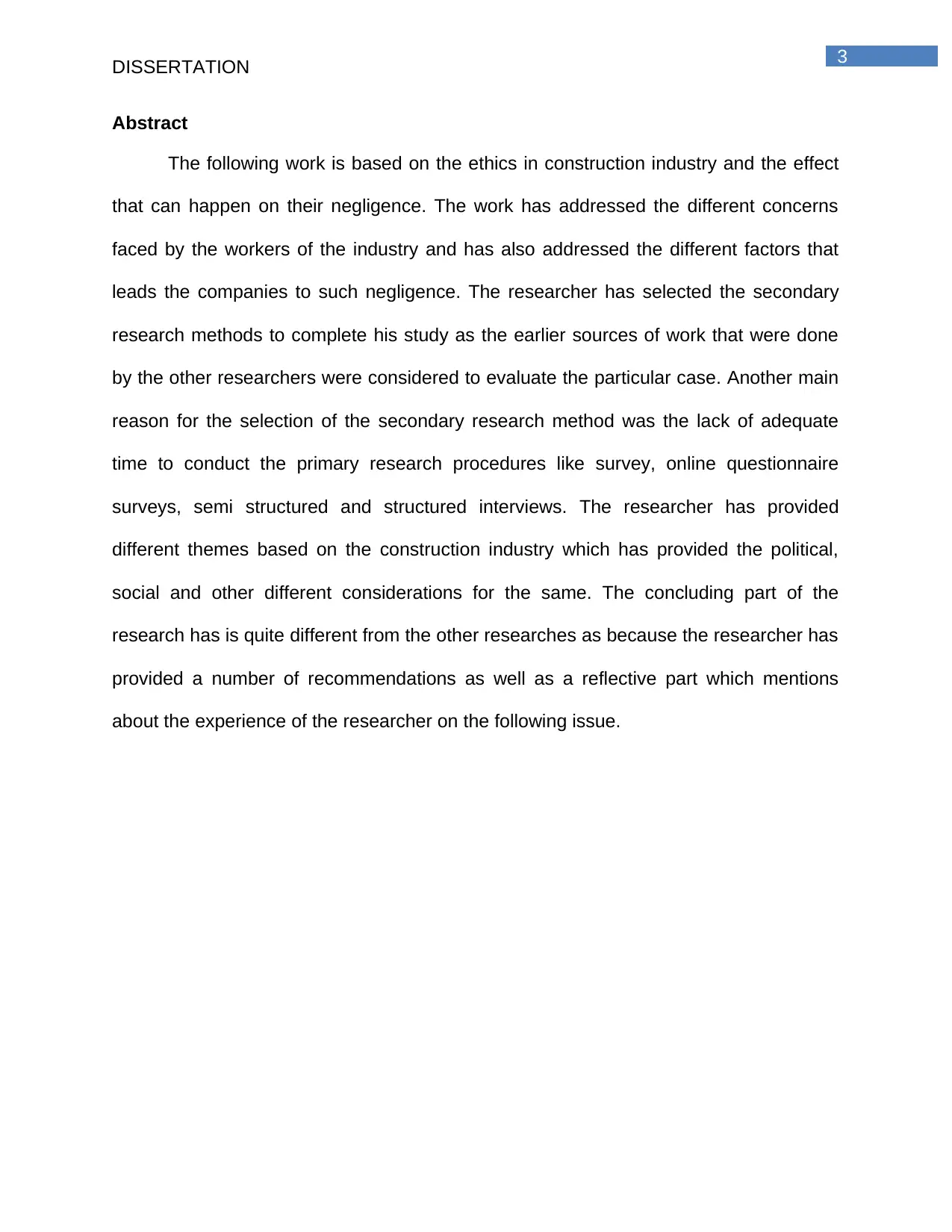
3
DISSERTATION
Abstract
The following work is based on the ethics in construction industry and the effect
that can happen on their negligence. The work has addressed the different concerns
faced by the workers of the industry and has also addressed the different factors that
leads the companies to such negligence. The researcher has selected the secondary
research methods to complete his study as the earlier sources of work that were done
by the other researchers were considered to evaluate the particular case. Another main
reason for the selection of the secondary research method was the lack of adequate
time to conduct the primary research procedures like survey, online questionnaire
surveys, semi structured and structured interviews. The researcher has provided
different themes based on the construction industry which has provided the political,
social and other different considerations for the same. The concluding part of the
research has is quite different from the other researches as because the researcher has
provided a number of recommendations as well as a reflective part which mentions
about the experience of the researcher on the following issue.
DISSERTATION
Abstract
The following work is based on the ethics in construction industry and the effect
that can happen on their negligence. The work has addressed the different concerns
faced by the workers of the industry and has also addressed the different factors that
leads the companies to such negligence. The researcher has selected the secondary
research methods to complete his study as the earlier sources of work that were done
by the other researchers were considered to evaluate the particular case. Another main
reason for the selection of the secondary research method was the lack of adequate
time to conduct the primary research procedures like survey, online questionnaire
surveys, semi structured and structured interviews. The researcher has provided
different themes based on the construction industry which has provided the political,
social and other different considerations for the same. The concluding part of the
research has is quite different from the other researches as because the researcher has
provided a number of recommendations as well as a reflective part which mentions
about the experience of the researcher on the following issue.
⊘ This is a preview!⊘
Do you want full access?
Subscribe today to unlock all pages.

Trusted by 1+ million students worldwide
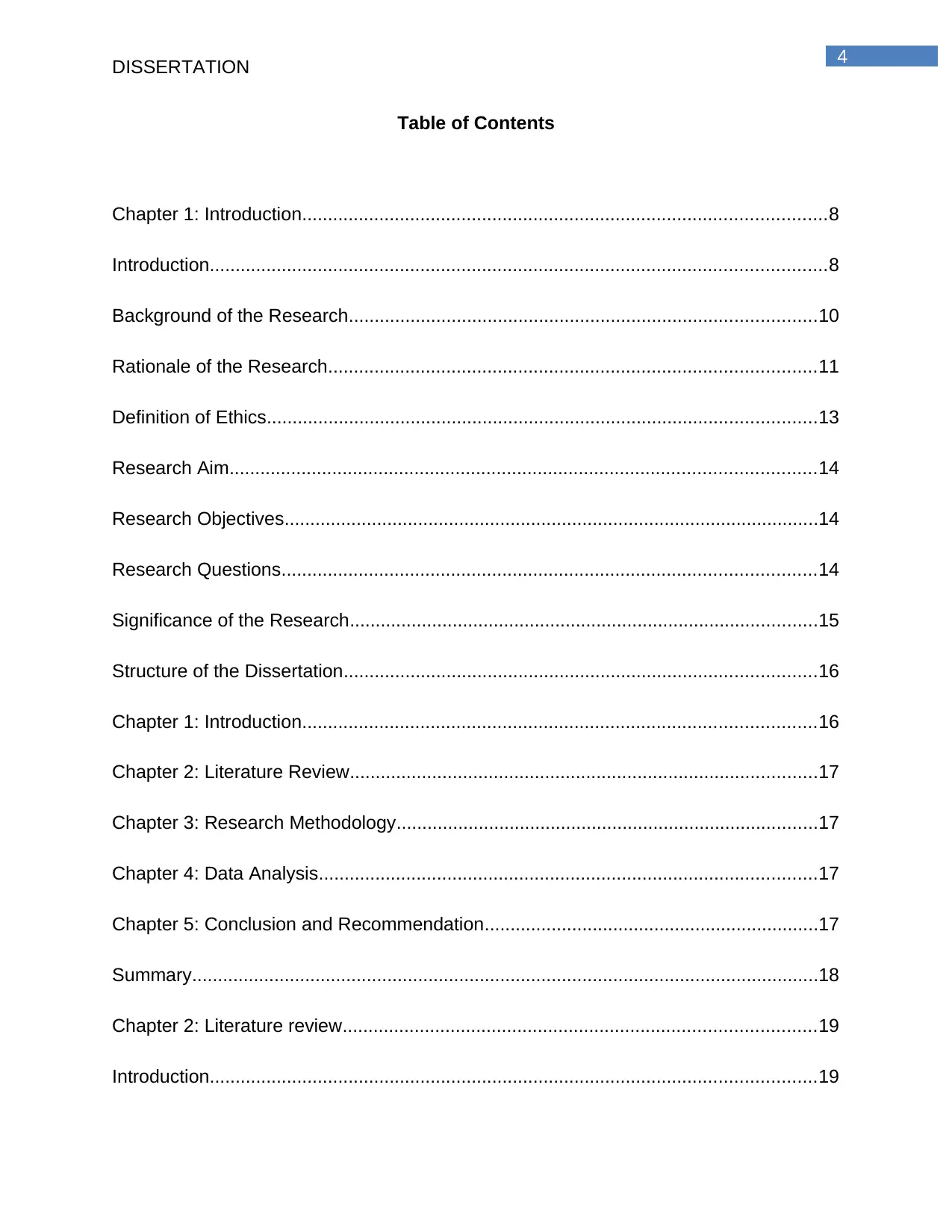
4
DISSERTATION
Table of Contents
Chapter 1: Introduction......................................................................................................8
Introduction........................................................................................................................8
Background of the Research...........................................................................................10
Rationale of the Research...............................................................................................11
Definition of Ethics...........................................................................................................13
Research Aim..................................................................................................................14
Research Objectives........................................................................................................14
Research Questions........................................................................................................14
Significance of the Research...........................................................................................15
Structure of the Dissertation............................................................................................16
Chapter 1: Introduction....................................................................................................16
Chapter 2: Literature Review...........................................................................................17
Chapter 3: Research Methodology..................................................................................17
Chapter 4: Data Analysis.................................................................................................17
Chapter 5: Conclusion and Recommendation.................................................................17
Summary..........................................................................................................................18
Chapter 2: Literature review............................................................................................19
Introduction......................................................................................................................19
DISSERTATION
Table of Contents
Chapter 1: Introduction......................................................................................................8
Introduction........................................................................................................................8
Background of the Research...........................................................................................10
Rationale of the Research...............................................................................................11
Definition of Ethics...........................................................................................................13
Research Aim..................................................................................................................14
Research Objectives........................................................................................................14
Research Questions........................................................................................................14
Significance of the Research...........................................................................................15
Structure of the Dissertation............................................................................................16
Chapter 1: Introduction....................................................................................................16
Chapter 2: Literature Review...........................................................................................17
Chapter 3: Research Methodology..................................................................................17
Chapter 4: Data Analysis.................................................................................................17
Chapter 5: Conclusion and Recommendation.................................................................17
Summary..........................................................................................................................18
Chapter 2: Literature review............................................................................................19
Introduction......................................................................................................................19
Paraphrase This Document
Need a fresh take? Get an instant paraphrase of this document with our AI Paraphraser
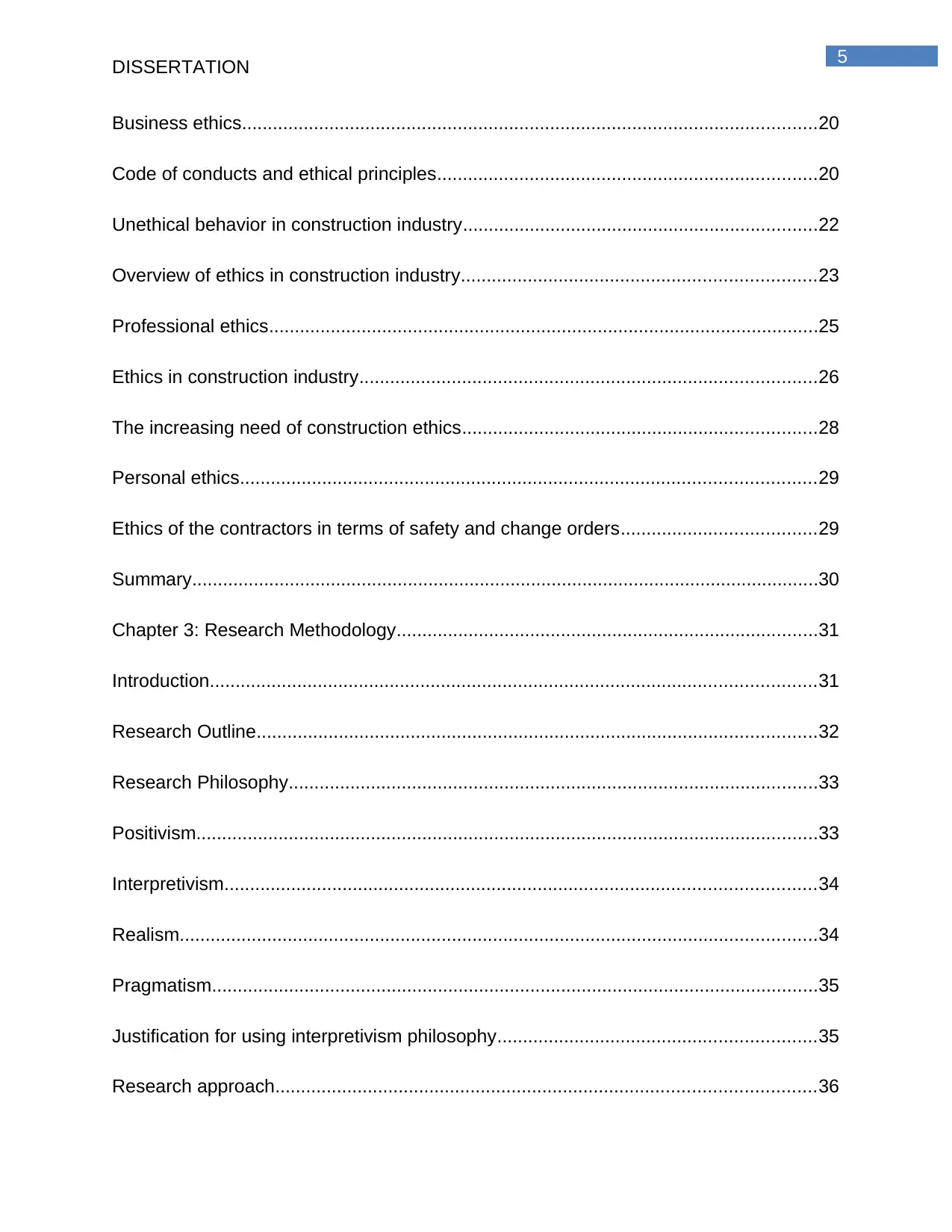
5
DISSERTATION
Business ethics................................................................................................................20
Code of conducts and ethical principles..........................................................................20
Unethical behavior in construction industry.....................................................................22
Overview of ethics in construction industry.....................................................................23
Professional ethics...........................................................................................................25
Ethics in construction industry.........................................................................................26
The increasing need of construction ethics.....................................................................28
Personal ethics................................................................................................................29
Ethics of the contractors in terms of safety and change orders......................................29
Summary..........................................................................................................................30
Chapter 3: Research Methodology..................................................................................31
Introduction......................................................................................................................31
Research Outline.............................................................................................................32
Research Philosophy.......................................................................................................33
Positivism.........................................................................................................................33
Interpretivism...................................................................................................................34
Realism............................................................................................................................34
Pragmatism......................................................................................................................35
Justification for using interpretivism philosophy..............................................................35
Research approach.........................................................................................................36
DISSERTATION
Business ethics................................................................................................................20
Code of conducts and ethical principles..........................................................................20
Unethical behavior in construction industry.....................................................................22
Overview of ethics in construction industry.....................................................................23
Professional ethics...........................................................................................................25
Ethics in construction industry.........................................................................................26
The increasing need of construction ethics.....................................................................28
Personal ethics................................................................................................................29
Ethics of the contractors in terms of safety and change orders......................................29
Summary..........................................................................................................................30
Chapter 3: Research Methodology..................................................................................31
Introduction......................................................................................................................31
Research Outline.............................................................................................................32
Research Philosophy.......................................................................................................33
Positivism.........................................................................................................................33
Interpretivism...................................................................................................................34
Realism............................................................................................................................34
Pragmatism......................................................................................................................35
Justification for using interpretivism philosophy..............................................................35
Research approach.........................................................................................................36
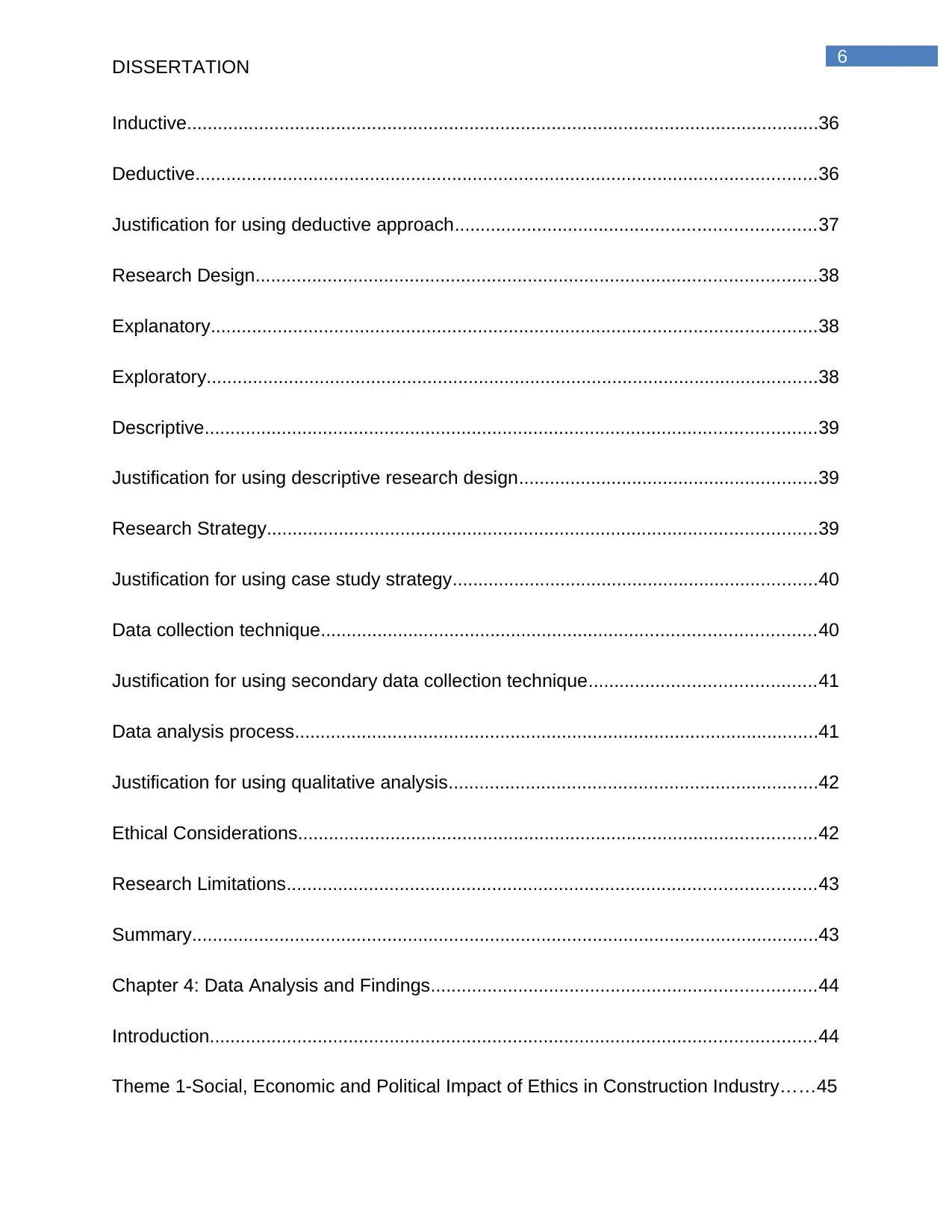
6
DISSERTATION
Inductive...........................................................................................................................36
Deductive.........................................................................................................................36
Justification for using deductive approach......................................................................37
Research Design.............................................................................................................38
Explanatory......................................................................................................................38
Exploratory.......................................................................................................................38
Descriptive.......................................................................................................................39
Justification for using descriptive research design..........................................................39
Research Strategy...........................................................................................................39
Justification for using case study strategy.......................................................................40
Data collection technique................................................................................................40
Justification for using secondary data collection technique............................................41
Data analysis process......................................................................................................41
Justification for using qualitative analysis........................................................................42
Ethical Considerations.....................................................................................................42
Research Limitations.......................................................................................................43
Summary..........................................................................................................................43
Chapter 4: Data Analysis and Findings...........................................................................44
Introduction......................................................................................................................44
Theme 1-Social, Economic and Political Impact of Ethics in Construction Industry……45
DISSERTATION
Inductive...........................................................................................................................36
Deductive.........................................................................................................................36
Justification for using deductive approach......................................................................37
Research Design.............................................................................................................38
Explanatory......................................................................................................................38
Exploratory.......................................................................................................................38
Descriptive.......................................................................................................................39
Justification for using descriptive research design..........................................................39
Research Strategy...........................................................................................................39
Justification for using case study strategy.......................................................................40
Data collection technique................................................................................................40
Justification for using secondary data collection technique............................................41
Data analysis process......................................................................................................41
Justification for using qualitative analysis........................................................................42
Ethical Considerations.....................................................................................................42
Research Limitations.......................................................................................................43
Summary..........................................................................................................................43
Chapter 4: Data Analysis and Findings...........................................................................44
Introduction......................................................................................................................44
Theme 1-Social, Economic and Political Impact of Ethics in Construction Industry……45
⊘ This is a preview!⊘
Do you want full access?
Subscribe today to unlock all pages.

Trusted by 1+ million students worldwide
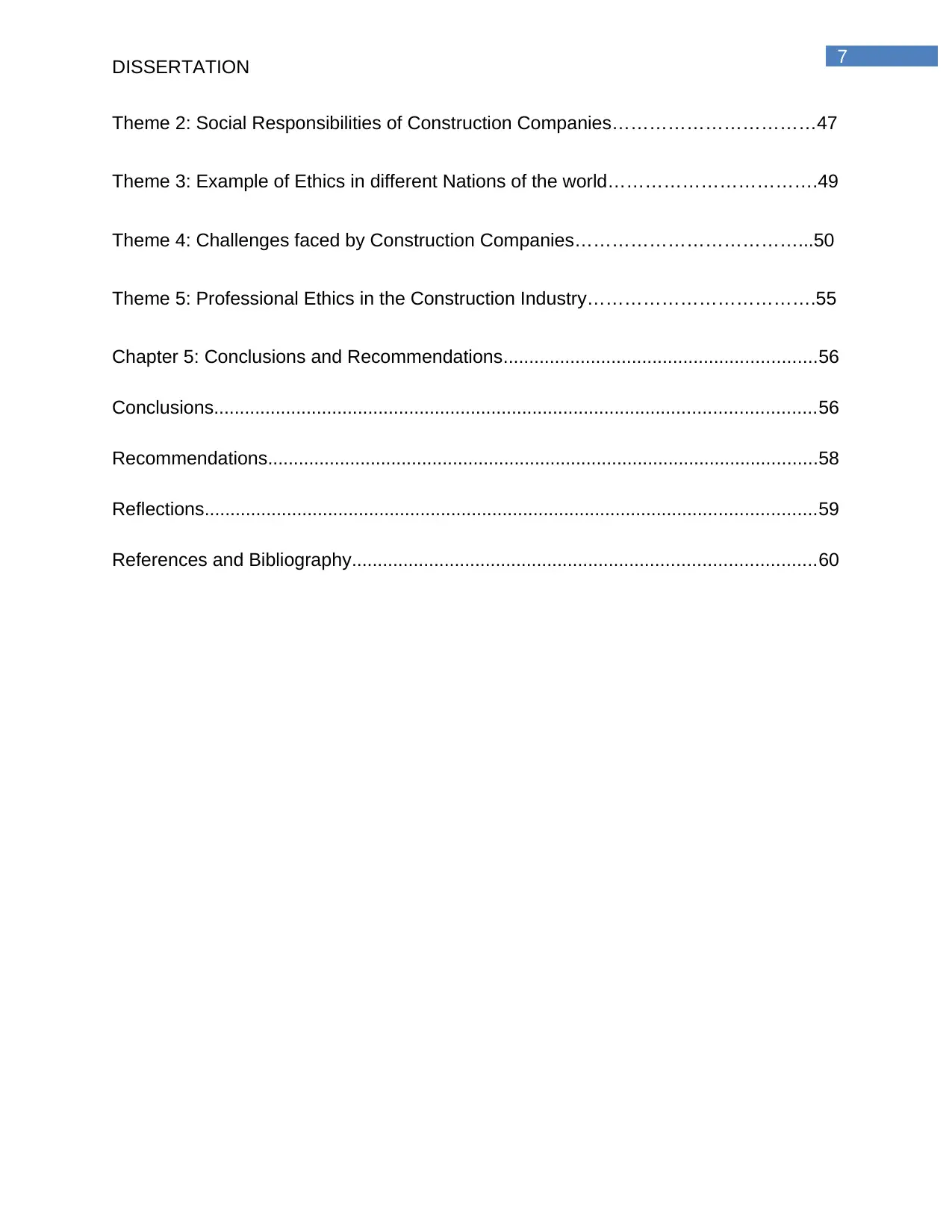
7
DISSERTATION
Theme 2: Social Responsibilities of Construction Companies……………………………47
Theme 3: Example of Ethics in different Nations of the world…………………………….49
Theme 4: Challenges faced by Construction Companies………………………………...50
Theme 5: Professional Ethics in the Construction Industry……………………………….55
Chapter 5: Conclusions and Recommendations.............................................................56
Conclusions.....................................................................................................................56
Recommendations...........................................................................................................58
Reflections.......................................................................................................................59
References and Bibliography..........................................................................................60
DISSERTATION
Theme 2: Social Responsibilities of Construction Companies……………………………47
Theme 3: Example of Ethics in different Nations of the world…………………………….49
Theme 4: Challenges faced by Construction Companies………………………………...50
Theme 5: Professional Ethics in the Construction Industry……………………………….55
Chapter 5: Conclusions and Recommendations.............................................................56
Conclusions.....................................................................................................................56
Recommendations...........................................................................................................58
Reflections.......................................................................................................................59
References and Bibliography..........................................................................................60
Paraphrase This Document
Need a fresh take? Get an instant paraphrase of this document with our AI Paraphraser
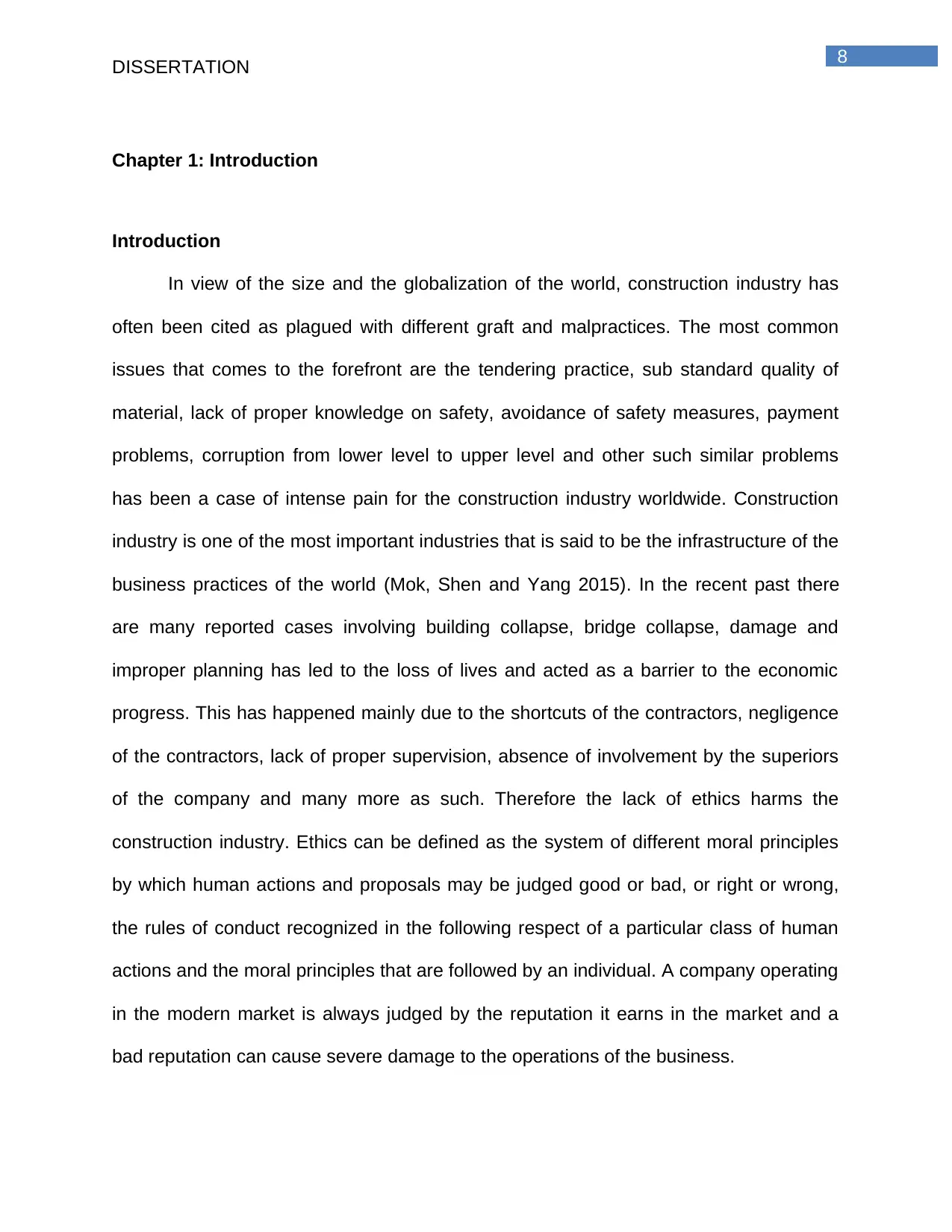
8
DISSERTATION
Chapter 1: Introduction
Introduction
In view of the size and the globalization of the world, construction industry has
often been cited as plagued with different graft and malpractices. The most common
issues that comes to the forefront are the tendering practice, sub standard quality of
material, lack of proper knowledge on safety, avoidance of safety measures, payment
problems, corruption from lower level to upper level and other such similar problems
has been a case of intense pain for the construction industry worldwide. Construction
industry is one of the most important industries that is said to be the infrastructure of the
business practices of the world (Mok, Shen and Yang 2015). In the recent past there
are many reported cases involving building collapse, bridge collapse, damage and
improper planning has led to the loss of lives and acted as a barrier to the economic
progress. This has happened mainly due to the shortcuts of the contractors, negligence
of the contractors, lack of proper supervision, absence of involvement by the superiors
of the company and many more as such. Therefore the lack of ethics harms the
construction industry. Ethics can be defined as the system of different moral principles
by which human actions and proposals may be judged good or bad, or right or wrong,
the rules of conduct recognized in the following respect of a particular class of human
actions and the moral principles that are followed by an individual. A company operating
in the modern market is always judged by the reputation it earns in the market and a
bad reputation can cause severe damage to the operations of the business.
DISSERTATION
Chapter 1: Introduction
Introduction
In view of the size and the globalization of the world, construction industry has
often been cited as plagued with different graft and malpractices. The most common
issues that comes to the forefront are the tendering practice, sub standard quality of
material, lack of proper knowledge on safety, avoidance of safety measures, payment
problems, corruption from lower level to upper level and other such similar problems
has been a case of intense pain for the construction industry worldwide. Construction
industry is one of the most important industries that is said to be the infrastructure of the
business practices of the world (Mok, Shen and Yang 2015). In the recent past there
are many reported cases involving building collapse, bridge collapse, damage and
improper planning has led to the loss of lives and acted as a barrier to the economic
progress. This has happened mainly due to the shortcuts of the contractors, negligence
of the contractors, lack of proper supervision, absence of involvement by the superiors
of the company and many more as such. Therefore the lack of ethics harms the
construction industry. Ethics can be defined as the system of different moral principles
by which human actions and proposals may be judged good or bad, or right or wrong,
the rules of conduct recognized in the following respect of a particular class of human
actions and the moral principles that are followed by an individual. A company operating
in the modern market is always judged by the reputation it earns in the market and a
bad reputation can cause severe damage to the operations of the business.
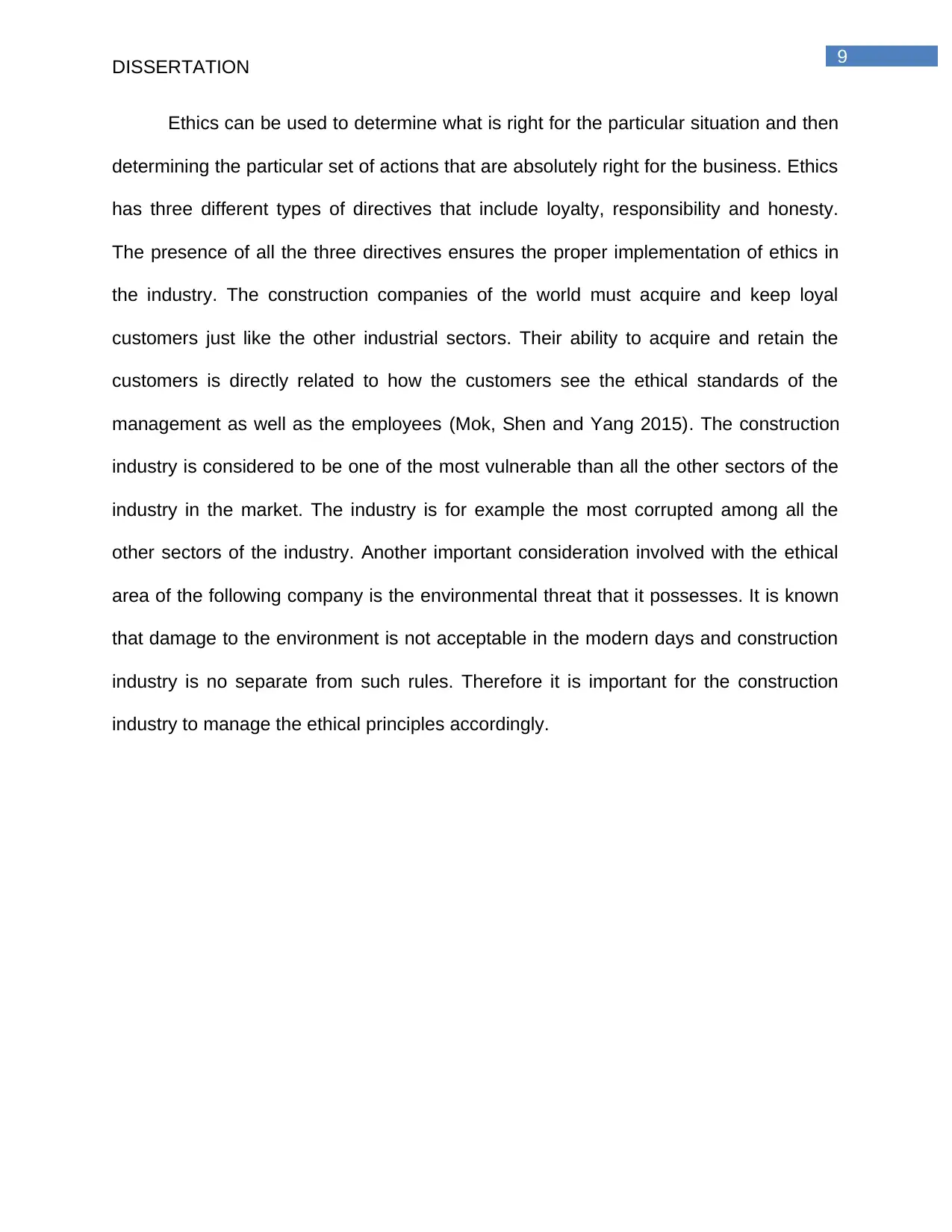
9
DISSERTATION
Ethics can be used to determine what is right for the particular situation and then
determining the particular set of actions that are absolutely right for the business. Ethics
has three different types of directives that include loyalty, responsibility and honesty.
The presence of all the three directives ensures the proper implementation of ethics in
the industry. The construction companies of the world must acquire and keep loyal
customers just like the other industrial sectors. Their ability to acquire and retain the
customers is directly related to how the customers see the ethical standards of the
management as well as the employees (Mok, Shen and Yang 2015). The construction
industry is considered to be one of the most vulnerable than all the other sectors of the
industry in the market. The industry is for example the most corrupted among all the
other sectors of the industry. Another important consideration involved with the ethical
area of the following company is the environmental threat that it possesses. It is known
that damage to the environment is not acceptable in the modern days and construction
industry is no separate from such rules. Therefore it is important for the construction
industry to manage the ethical principles accordingly.
DISSERTATION
Ethics can be used to determine what is right for the particular situation and then
determining the particular set of actions that are absolutely right for the business. Ethics
has three different types of directives that include loyalty, responsibility and honesty.
The presence of all the three directives ensures the proper implementation of ethics in
the industry. The construction companies of the world must acquire and keep loyal
customers just like the other industrial sectors. Their ability to acquire and retain the
customers is directly related to how the customers see the ethical standards of the
management as well as the employees (Mok, Shen and Yang 2015). The construction
industry is considered to be one of the most vulnerable than all the other sectors of the
industry in the market. The industry is for example the most corrupted among all the
other sectors of the industry. Another important consideration involved with the ethical
area of the following company is the environmental threat that it possesses. It is known
that damage to the environment is not acceptable in the modern days and construction
industry is no separate from such rules. Therefore it is important for the construction
industry to manage the ethical principles accordingly.
⊘ This is a preview!⊘
Do you want full access?
Subscribe today to unlock all pages.

Trusted by 1+ million students worldwide
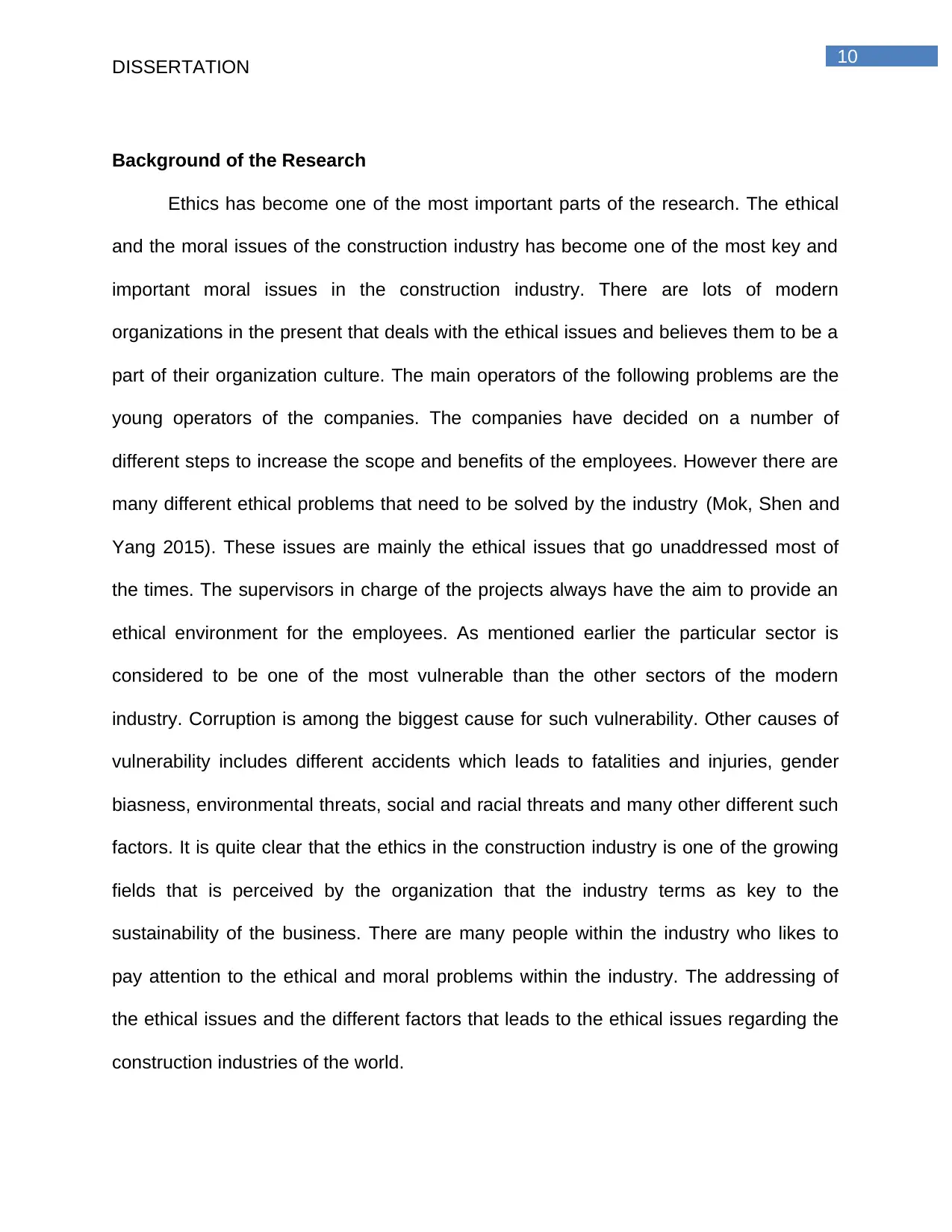
10
DISSERTATION
Background of the Research
Ethics has become one of the most important parts of the research. The ethical
and the moral issues of the construction industry has become one of the most key and
important moral issues in the construction industry. There are lots of modern
organizations in the present that deals with the ethical issues and believes them to be a
part of their organization culture. The main operators of the following problems are the
young operators of the companies. The companies have decided on a number of
different steps to increase the scope and benefits of the employees. However there are
many different ethical problems that need to be solved by the industry (Mok, Shen and
Yang 2015). These issues are mainly the ethical issues that go unaddressed most of
the times. The supervisors in charge of the projects always have the aim to provide an
ethical environment for the employees. As mentioned earlier the particular sector is
considered to be one of the most vulnerable than the other sectors of the modern
industry. Corruption is among the biggest cause for such vulnerability. Other causes of
vulnerability includes different accidents which leads to fatalities and injuries, gender
biasness, environmental threats, social and racial threats and many other different such
factors. It is quite clear that the ethics in the construction industry is one of the growing
fields that is perceived by the organization that the industry terms as key to the
sustainability of the business. There are many people within the industry who likes to
pay attention to the ethical and moral problems within the industry. The addressing of
the ethical issues and the different factors that leads to the ethical issues regarding the
construction industries of the world.
DISSERTATION
Background of the Research
Ethics has become one of the most important parts of the research. The ethical
and the moral issues of the construction industry has become one of the most key and
important moral issues in the construction industry. There are lots of modern
organizations in the present that deals with the ethical issues and believes them to be a
part of their organization culture. The main operators of the following problems are the
young operators of the companies. The companies have decided on a number of
different steps to increase the scope and benefits of the employees. However there are
many different ethical problems that need to be solved by the industry (Mok, Shen and
Yang 2015). These issues are mainly the ethical issues that go unaddressed most of
the times. The supervisors in charge of the projects always have the aim to provide an
ethical environment for the employees. As mentioned earlier the particular sector is
considered to be one of the most vulnerable than the other sectors of the modern
industry. Corruption is among the biggest cause for such vulnerability. Other causes of
vulnerability includes different accidents which leads to fatalities and injuries, gender
biasness, environmental threats, social and racial threats and many other different such
factors. It is quite clear that the ethics in the construction industry is one of the growing
fields that is perceived by the organization that the industry terms as key to the
sustainability of the business. There are many people within the industry who likes to
pay attention to the ethical and moral problems within the industry. The addressing of
the ethical issues and the different factors that leads to the ethical issues regarding the
construction industries of the world.
Paraphrase This Document
Need a fresh take? Get an instant paraphrase of this document with our AI Paraphraser
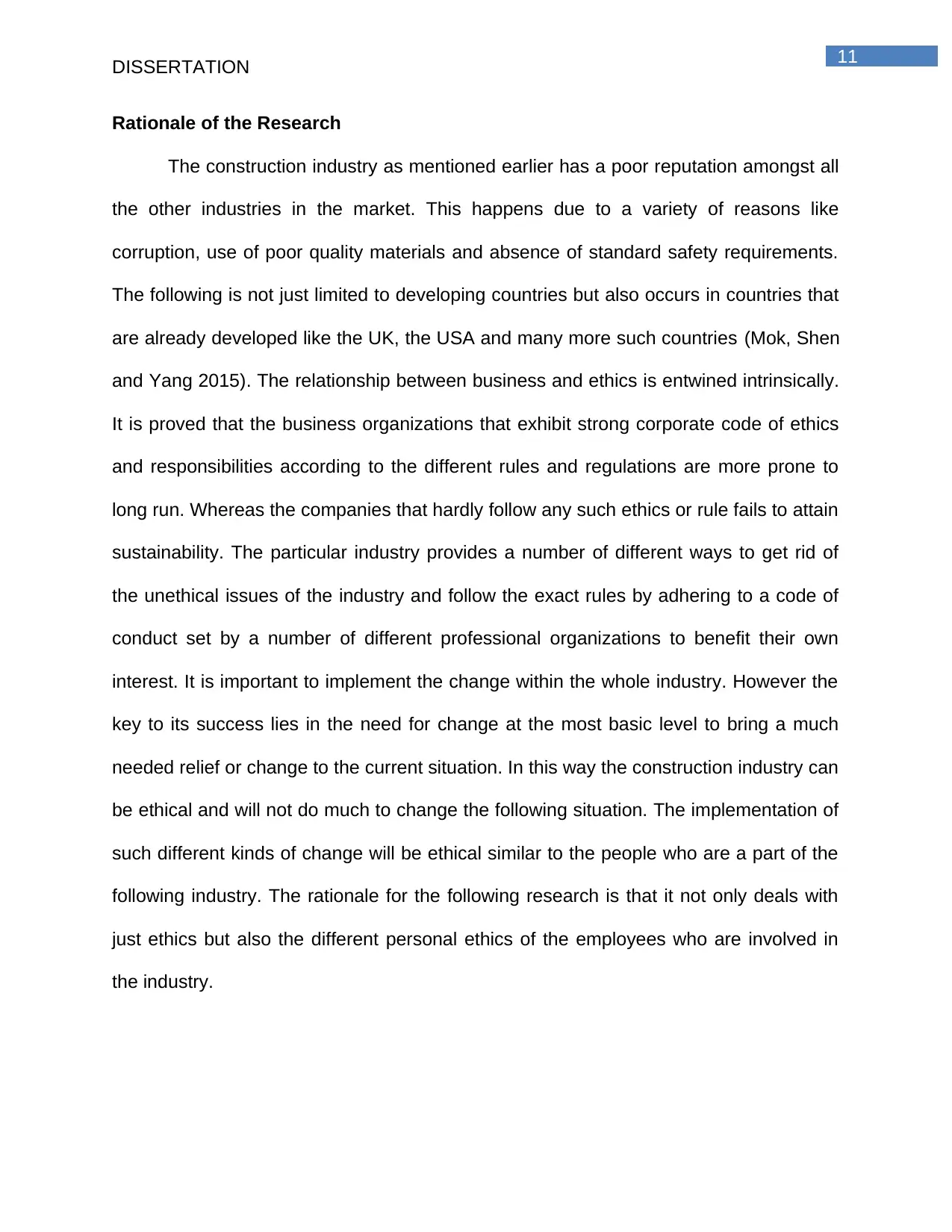
11
DISSERTATION
Rationale of the Research
The construction industry as mentioned earlier has a poor reputation amongst all
the other industries in the market. This happens due to a variety of reasons like
corruption, use of poor quality materials and absence of standard safety requirements.
The following is not just limited to developing countries but also occurs in countries that
are already developed like the UK, the USA and many more such countries (Mok, Shen
and Yang 2015). The relationship between business and ethics is entwined intrinsically.
It is proved that the business organizations that exhibit strong corporate code of ethics
and responsibilities according to the different rules and regulations are more prone to
long run. Whereas the companies that hardly follow any such ethics or rule fails to attain
sustainability. The particular industry provides a number of different ways to get rid of
the unethical issues of the industry and follow the exact rules by adhering to a code of
conduct set by a number of different professional organizations to benefit their own
interest. It is important to implement the change within the whole industry. However the
key to its success lies in the need for change at the most basic level to bring a much
needed relief or change to the current situation. In this way the construction industry can
be ethical and will not do much to change the following situation. The implementation of
such different kinds of change will be ethical similar to the people who are a part of the
following industry. The rationale for the following research is that it not only deals with
just ethics but also the different personal ethics of the employees who are involved in
the industry.
DISSERTATION
Rationale of the Research
The construction industry as mentioned earlier has a poor reputation amongst all
the other industries in the market. This happens due to a variety of reasons like
corruption, use of poor quality materials and absence of standard safety requirements.
The following is not just limited to developing countries but also occurs in countries that
are already developed like the UK, the USA and many more such countries (Mok, Shen
and Yang 2015). The relationship between business and ethics is entwined intrinsically.
It is proved that the business organizations that exhibit strong corporate code of ethics
and responsibilities according to the different rules and regulations are more prone to
long run. Whereas the companies that hardly follow any such ethics or rule fails to attain
sustainability. The particular industry provides a number of different ways to get rid of
the unethical issues of the industry and follow the exact rules by adhering to a code of
conduct set by a number of different professional organizations to benefit their own
interest. It is important to implement the change within the whole industry. However the
key to its success lies in the need for change at the most basic level to bring a much
needed relief or change to the current situation. In this way the construction industry can
be ethical and will not do much to change the following situation. The implementation of
such different kinds of change will be ethical similar to the people who are a part of the
following industry. The rationale for the following research is that it not only deals with
just ethics but also the different personal ethics of the employees who are involved in
the industry.
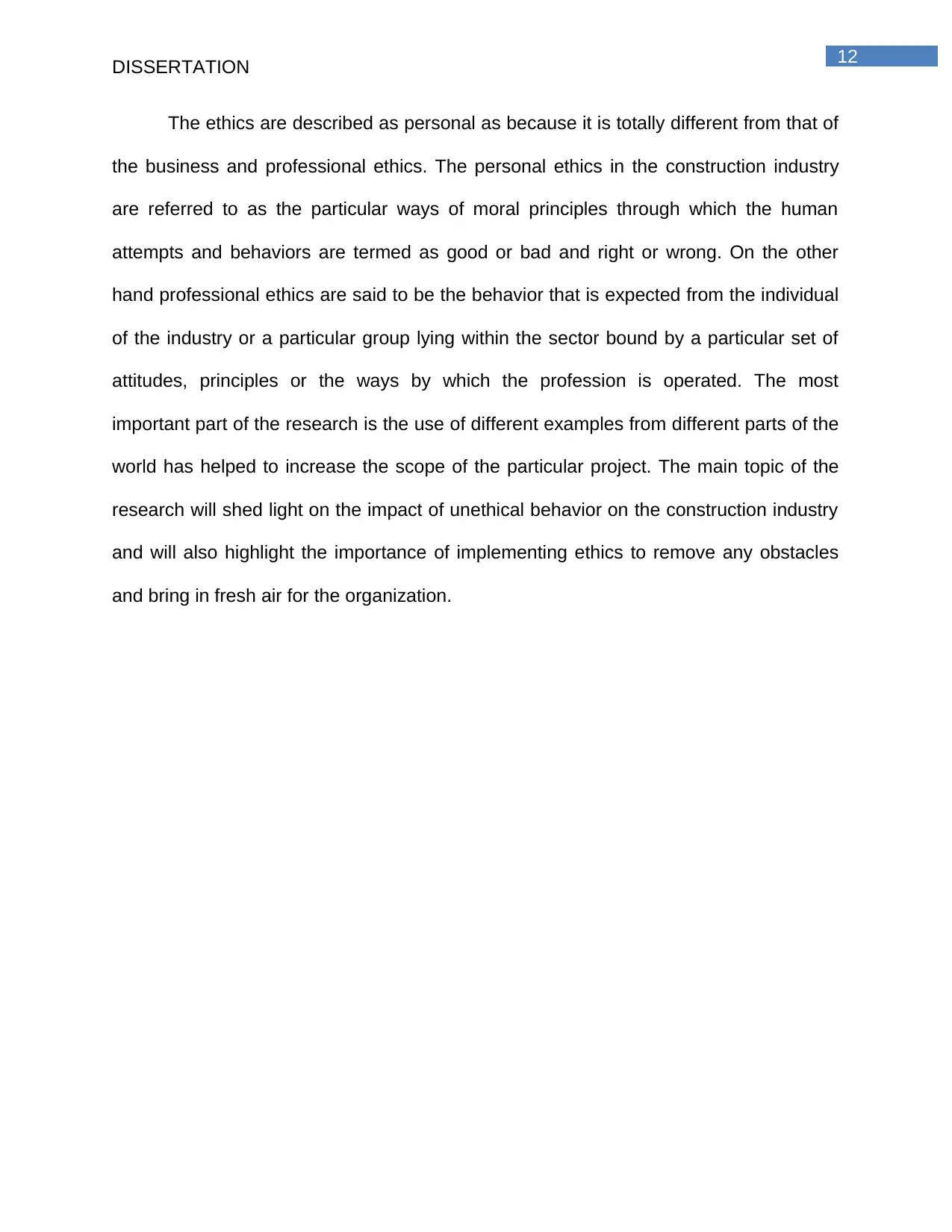
12
DISSERTATION
The ethics are described as personal as because it is totally different from that of
the business and professional ethics. The personal ethics in the construction industry
are referred to as the particular ways of moral principles through which the human
attempts and behaviors are termed as good or bad and right or wrong. On the other
hand professional ethics are said to be the behavior that is expected from the individual
of the industry or a particular group lying within the sector bound by a particular set of
attitudes, principles or the ways by which the profession is operated. The most
important part of the research is the use of different examples from different parts of the
world has helped to increase the scope of the particular project. The main topic of the
research will shed light on the impact of unethical behavior on the construction industry
and will also highlight the importance of implementing ethics to remove any obstacles
and bring in fresh air for the organization.
DISSERTATION
The ethics are described as personal as because it is totally different from that of
the business and professional ethics. The personal ethics in the construction industry
are referred to as the particular ways of moral principles through which the human
attempts and behaviors are termed as good or bad and right or wrong. On the other
hand professional ethics are said to be the behavior that is expected from the individual
of the industry or a particular group lying within the sector bound by a particular set of
attitudes, principles or the ways by which the profession is operated. The most
important part of the research is the use of different examples from different parts of the
world has helped to increase the scope of the particular project. The main topic of the
research will shed light on the impact of unethical behavior on the construction industry
and will also highlight the importance of implementing ethics to remove any obstacles
and bring in fresh air for the organization.
⊘ This is a preview!⊘
Do you want full access?
Subscribe today to unlock all pages.

Trusted by 1+ million students worldwide
1 out of 68
Related Documents
Your All-in-One AI-Powered Toolkit for Academic Success.
+13062052269
info@desklib.com
Available 24*7 on WhatsApp / Email
![[object Object]](/_next/static/media/star-bottom.7253800d.svg)
Unlock your academic potential
Copyright © 2020–2026 A2Z Services. All Rights Reserved. Developed and managed by ZUCOL.





